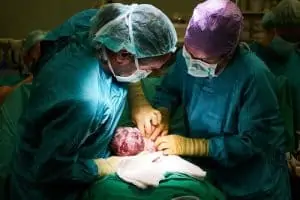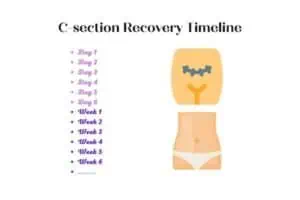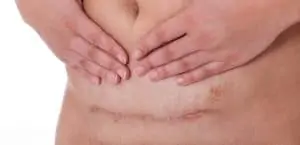I’ve been writing a lot about c-sections lately, and I think you all need to know more about the possible complications that may arise years down the road from having a c-section — or having more than one.
This isn’t meant to freak you out in any way, but rather help you stay informed so if you do notice anything, you can talk to your doctor and stay on top of things. Some of us have no choice in how we bring our sweet babies into the world. We’re all moms no matter how those babies come out of us, so don’t forget that.
Still, your health is of utmost importance, and there are some things you’ll find that c-sections make more complicated down the road. Wondering how it affects growing your family? Your risks of having more c-sections? The side effects? Keep reading, and we’ll get to all that to calm your fears and prepare you.
Do C-Sections Affect Future Pregnancies?
Yes, they do. You’re more of a high-risk case after your first c-section, depending on how quickly you get pregnant after that. If you wait (at least 18 months) and your doctor feels confident in how you’ve healed, you can try for a VBAC. I recently mentioned how my doctor put that option on the table for me. Still, I decided to go for another c-section rather than risk being stuck in another horrible labor situation.
What Risks are There for Repeat C-Sections?
There’s no hard and fast set rule regarding how many c-sections you can have, but since it’s major abdominal surgery, it stands to reason that the more you do it, the more dangerous it is.
With every c-section:
You have a higher risk for bladder and bowel injuries, heavy bleeding, or problems with your placenta. If you have your heart set on a big family, you might want to see about delivering vaginally or trying for a VBAC if you’ve already had a c-section.
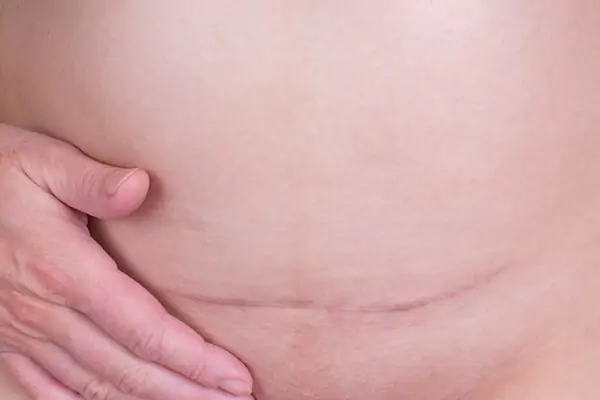
You may also find your c-section scar hurts years later. It’s not supposed to, but it certainly can. I’d like you to read about what I wrote on that recently, so you’re all caught up.
What are the Side Effects of C-Sections, Both Short and Long-Term?
There are a few (ok, more than a few) things you should keep tabs on when you undergo a c-section. Some of them may be problematic soon after your surgery, while others might not arise later in life. Keeping an eye on your health and talking with your doctor can often help spot problems before they get worse. Here are possible issues you may encounter with c-section complications years later.
- Possible hysterectomy
The Journal of the American Medical Association announced that women with one or more c-sections have a higher risk of getting a hysterectomy years later. The reason is from scarring of internal tissues, and with each c-section, more scar tissues build up. It’s not always the case, but you should be fully aware, especially if any complications arise.
- Conception complications

As mentioned in my last point, that scar tissue can mess things up as your body recovers. Yes, it’s totally natural, though there’s no way to predict how it will form inside your body. It could very well connect to your bladder or uterus and, thus, ruin your chances of conceiving again or create quite a bit of pain.
If you feel pain around your c-section scar, you should discuss it with your doctor immediately to rule out any scar tissue issues.
Adhesions are another one that forms just after surgery but might not be evident even years later. These can cause blockages if you don’t keep tabs on them. They are created by c-section scars when you don’t properly care for them. Please be sure to follow exactly what your doctor advises when caring for your incision area post-surgery.
- Placenta problems
With both placenta previa (when your uterus overlaps many of your reproductive organs) and placenta accreta (when trophoblasts grow in the uterus after implantation), you’re more likely to have these conditions if you have numerous c-sections. However, the good news is that your doctor can easily recognize them. Still, the possibility looms that you might have problems with your placenta, particularly if you have more than one c-section.
- Emotional overload
Ah, hormones. I’ve talked at length about pregnancy hormones and how your hormones can drive you mad postpartum. With c-sections, though, we tend to guilt ourselves about how we brought our sweet babies into the world. And when it’s an emergency c-section, the emotions can really run high.
Please read my post about hormones to know the difference between baby blues and postpartum depression. If you are struggling with your emotions, you’re not alone. It’s very typical, though; please get help. Your doctor can help you even out those hormones and get you feeling like yourself again.
- Risk of infection
Even in today’s day and age, germs can and do occur with c-sections. Your incision might not heal as well as expected…even years later! As you can expect, you’ll know if your incision is infected if it hurts. That’s why in my other post, I urged you to contact your doctor immediately. It can lead to abscesses if you ignore it.
- Sepsis
Sepsis, while rarer, is also a severe concern for anyone having surgery. This bacterial infection can spread from the uterus where the incision was and move into your bloodstream. In the days following your c-section, you should immediately seek treatment if you have an extremely high fever, fast heart rate, breathing, and chills. It can be treated if caught early on, which is why your doctor will tell you to watch out for these critical symptoms.
- Weakened abdominal muscles
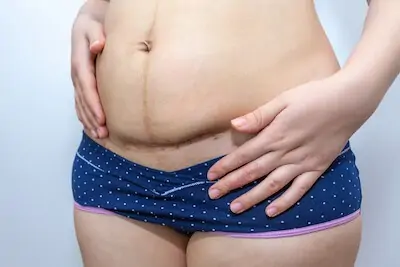
Because your abdominals will be cut to get to your uterus, it takes time for them to recover. The muscles are compromised, and you’ll need to take extra care when getting back into your fitness routine (once you’re cleared for full-on exercise). Moreover, you may never get rid of that pouch from your c-section (read about that here).
- Bearing the scars
With c-sections today, the most common type of incision is low transverse. This can easily be hidden even when wearing a bikini. When done very well, you’ll barely even notice the scar yourself. I’m eternally grateful to my doctor in China for stitching me up so pristinely both times.
While doctors will try for the low transverse incision, some situations leave them with little choice but to make vertical incisions. Those are certainly less common, but you should be prepared that you might have a large scar on your abdomen.
- Endometriosis
While it can certainly happen before you become pregnant, endometriosis (when uterine tissue connects to surrounding organs) is very painful. With more c-sections, you have a higher risk for it. You’ll know something is amiss, though, as it’s excruciating. It’s a chronic condition that can be treated to minimize the symptoms, which is why it’s so important to notify your doctor if you feel any pain after your c-section – even years later!
- Difficulties losing weight
With c-sections, it can be much more challenging to lose weight. For starters, we’re not allowed to exercise until after our postpartum checkup (except for gentle walking, which is always encouraged).
Add to that,
The challenge of trying to get a workout in when the baby is, well, a baby, and the exhaustion. And the pain! It can still feel sore, especially at the abdominal site, when you’re working on getting your body back.
It could take you years to see the results you want, and even then, you might not get your body back to your idea of perfect. And hey, that’s ok. Get yourself healthy. Sometimes depression ties right into this too. I’ve been there trying to get my body back in shape, and it is so hard. Just know that when other moms see you, they know that you’re a mom, too and part of the tribe.
Note that:
If you’re really frustrated by your weight, make changes to your diet. This is the most critical aspect of controlling weight. There’s no need to starve, but there is a huge need for you to stop eating sugar and processed foods. You’ll see the scale in your favor by doing that simple thing.
- Chance of detachment
I’m going to address this because I know many of you worry that if you have a c-section, you won’t bond with your baby. NOT TRUE! Even moms I know who delivered vaginally had the same feelings.
This is just normal for becoming a mom, no matter how you become one. For my eldest, they handed me her to breastfeed her shortly after my surgery, and my vitals and I nearly screamed.
I’ll never forget it. I was scared of her. I was scared of this wrinkly little thing. 🙁
And then, just as quickly as that panic set in, it suddenly erased away, and I was overwhelmed with such love that it was astounding.
With my second daughter, I would call my dad on Skype and ask him how I would love the new baby as much as my first one. My dad assured me that I’d love her just as much on an equal yet separate plain. It made no sense though until after she was born.
At first, I was kind and caring to my second-born while in the hospital. But I didn’t feel a bond. Perhaps it was the whole air-conditioning debacle (you can read that here), and I couldn’t get comfortable. But once, I was walking around about 48 hours later, holding her, and I suddenly burst into tears because I realized I loved her so insanely much.
Sometimes, it just takes time to feel that feeling. And that’s ok! If you’re concerned about not feeling it after a week, contact your doctor because it is definitely hormone-related.
But wait…there’s good news!
For quite some time, it was presumed that women who underwent c-sections had more trouble with urinary incontinence. Still, a study released in 2018 reveals you are less likely to pee when you laugh or to have pelvic organ prolapse. See? So that’s something!
Anyway, as I’ve mentioned before, some of us don’t get a choice about having a c-section, at least the first time around. If you’re like me and have an emergency, there’s nothing you can do about it, and you should think about it positively. Your health and your baby’s health are more important than anything else.
While these c-section complications do exist, they aren’t as common. What helps is following doctor’s orders and taking care of yourself. You should also make sure that your doctor has an outstanding track record. Lucky for me, my doctor was the most revered at c-sections in our entire province. Every other expat I knew had their babies delivered by her – both vaginally and c-sections.
Finally:
Worrying won’t do any good, so I present these facts to help you become aware. Remember, if something doesn’t feel right inside your body or mind, there is help. Just ask, and DO NOT be ashamed about it. None of us are SuperMom here. Support is how we accomplish all the amazing things that we do.
Leslie Berry lives with her husband and two young daughters in Los Altos, California, where she loves helping other moms get comfortable with motherhood and embracing the insanity with facts peppered with laughs.
She loves eating too much sushi, exercising, and jamming out on her Fender. Read more about Leslie here.


